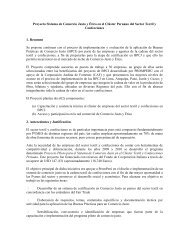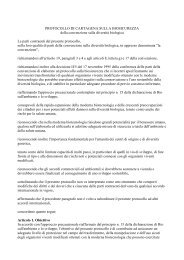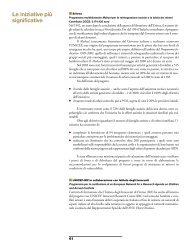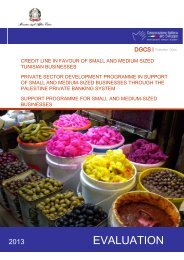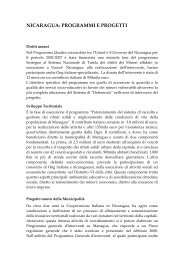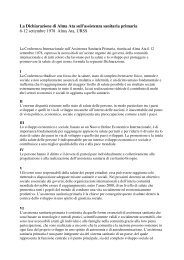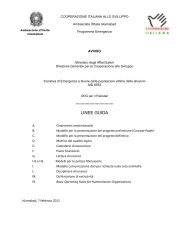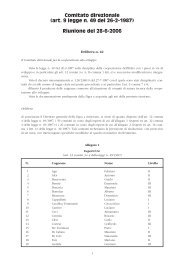FRONTESPIZIO - Cooperazione Italiana allo Sviluppo
FRONTESPIZIO - Cooperazione Italiana allo Sviluppo
FRONTESPIZIO - Cooperazione Italiana allo Sviluppo
Create successful ePaper yourself
Turn your PDF publications into a flip-book with our unique Google optimized e-Paper software.
62 Carlo Resti, Yohannes Tadesseciencies of personal with specific skills (e.g. the UK reports huge shortages innurses). Scaling-up of interventions will require staffing of health serviceswith appropriate skill mixes. Regions with high HIV/AIDS prevalence arelikely to rely on other skill mix patterns than regions where acute respiratoryinfections in children or malaria are predominant. Thus, it will not beenough to develop and implement staffing norms across a country, but to <strong>allo</strong>wfor variation based on cultural contexts and current and future epidemiologicalpatterns of priority diseases.As it is well known, organizational and management issues at the health sectorlevel can influence performance and productivity. Setting correct incentives inthe health sector will be of crucial importance for having the right skill mix atthe right place and for addressing geographical imbalances in the distributionof HRH and for establishing appropriate staffing patterns. For example, careerplans, salary levels, recruitment, appointment and retention procedures willstrongly affect where health workers practice and whether they will remain inthe health sector or in the hardship, remote areas of the country.Salary level is strongly linked with motivation and retention. In many countriessalaries of the governmental health sector workforce are low, in both absoluteand relative terms. Parallel activities, such as working during the morningshift for a public provider and in the afternoon for a private one is a commonstrategy to complement low salary levels. In order to retain health staffat the work place and in the health sector, it will be necessary to considersalary increases. As in many countries HRH absorb already an important partof sector budgets (often around 80%), a significant increase in the pay ofhealth sector workers may reveal difficult in terms of preferences and choicesto be given to salary expenditures and in terms of the economic and politicalfeasibility. The macroeconomic environment will also determine the publicsalary level.However, the experience of countries which have used monetary incentivesfor addressing motivation and imbalances in the geographical distribution ofhealth workers indicates that non-monetary incentives are as important.Other factors such as proximity to the family, continuous education, opportunitiesfor research and teaching also can influence an individual’s decisionwhere to work.Building up training capacityIn many countries, the scaling-up of priority interventions will require newpersonnel to be trained, especially general practitioners and nurses. Scaling-





